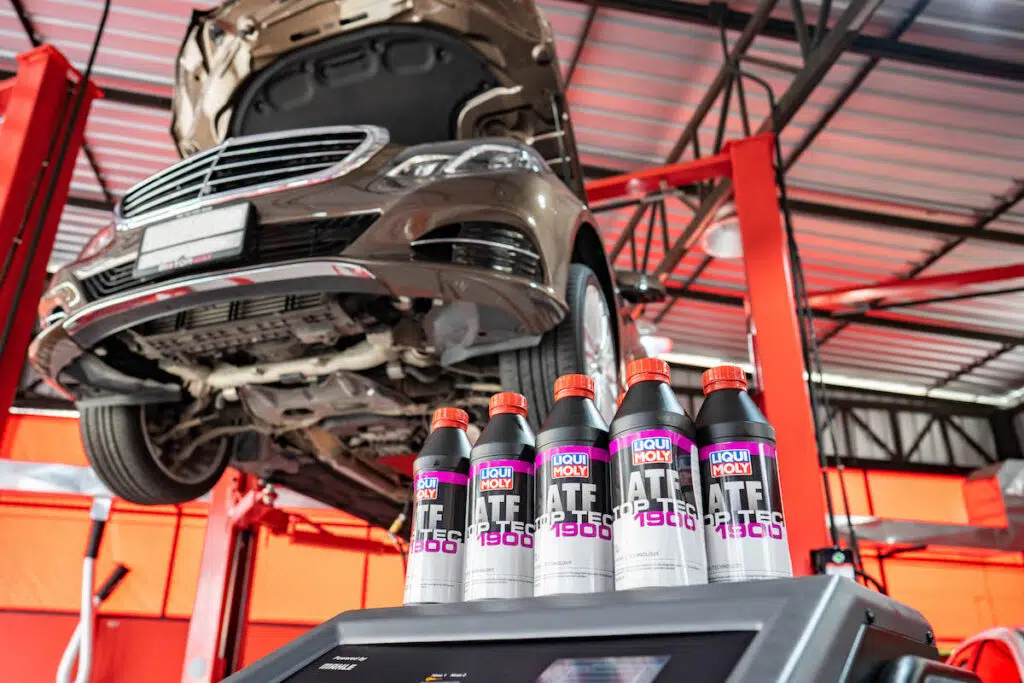Transmission of fluids can be a major headache for people unfamiliar with them. In the past, many people have thought of them as expensive fillers with no purpose.
This is simply not true. Transmission fluid is an important part of an automatic transmission, and it’s important to know what to look for when you’re buying one.
Transmission fluids are a critical part of mechanical and hydraulic systems. Without proper lubrication, components will seize and wear out quickly. However, the oils used in transmission fluids can degrade over time and may cause damage to your transmission, causing malfunctioning and costly repairs.
Whether you’re looking for an oil change at a dealership or you’re changing your own transmission fluid, it’s important to understand a few things about transmission fluids.
What Is In Transmission Fluids
Transmission fluid comprises two major components: base oil and detergent. The base oil keeps the transmission fluid from getting contaminated as it travels through the system. If you notice your engine is pulling hard on starts, then check to see if your trans slip is too high. The trans slip is how much pressure there is in the trans. If you see that the trans has too much pressure in the trans, this is the reason why it’s slipping.
The detergent helps break down any sludge that might be built up in the system, allowing your transmission to shift easily with less friction. A dirty transmission will require more pressure to shift than one that’s clean.
Types Of Transmission Oil
There are three types of transmission fluid: wet, synthetic, and mineral. Wet refers to traditional mineral oil or synthetic motor oil. Mineral oil is a mixture of hydrocarbons (mostly petroleum) and additives like silicone that helps make the fluid slippery so it flows easily.
Synthetic oil has been formulated specifically to provide optimal performance in a specific transmission operating range; this makes it great for people doing high-mileage driving and those who want to preserve the life of their transmission fluid by avoiding the use of regular mineral oil. It also remains slick even at low temperatures, which can be very beneficial in extreme weather conditions like those found in the UK.
Mineral oil has long been used in transmissions because it provides excellent lubrication with little slip or risk to the other components of the transmission (gearboxes, clutches, etc.).
MyCar.Repair Tips
- Don’t let the fluid get too hot. Hot transmission fluid can cause metal parts to stick together, which can lead to premature wear. That’s bad for your car, but it’s even worse for your transmission.
- Don’t use mineral oil as a substitute for transmission fluid. Mineral oil can be used as a cheaper alternative to transaxle fluid, but it is not recommended because it has a higher boiling point than transaxle fluid, which causes mineral oil to vaporise before it reaches transmission. A mechanic can confirm whether you need transaxle fluid or mineral oil by checking the colour of the fluid — if it looks like motor oil, you need transaxle fluid; if it looks like water or is clear, you need mineral oil.
Additives
How do transmission fluid and transmission fluid additives affect your car? What are the pros and cons of using transmission fluid additives? To find the answers to these questions, let’s first look at three common transmission fluids used in today’s vehicles.
1. Automatic Transmission Fluid (ATF)
ATF is a proprietary blend of synthetic base oils and other additives that can be formulated to meet the temperature requirements of your vehicle and the operating range of your transmission. ATF serves as a lubricant, dispersing heat and providing proper hydraulic continuity between components within the transmission.
2. Automatic Transmission Fluid Additives (ATFA)
ATFA is a synthetic base oil with special additives designed to meet the needs of transmissions for specific driving conditions, including different gear-mapping strategies. ATFA also enhances performance by preventing corrosion, minimises shifting problems caused by extreme hot or cold temperatures, increases gear performance and shift ability optimises shift ability during acceleration.
3. Manual Transmission Fluid (MTF)
MTF is a long-established blend for manual transmissions that provides protection against wear and contamination, besides controlling internal friction. MTF also keeps seals free from debris buildup that can cause leaks, eliminates noise caused by sludge build-up or deteriorating metal parts, improves clutch wear and helps for smoother gear shifts.
Transmission fluid is the lube that keeps your car moving. Think of it as the oil in an engine. The transmission, also referred to as a gearbox, is the part of your car’s engine between the engine and the wheels.
It works by lubricating metal surfaces so they can slide against each other causing movement. The metal surfaces include those that make contact with each other such as gears, shafts and bearings. Make sure you take care and replace yours at the correct intervals. Check out our list of LIQUI MOLY transmission products, including complete change kits for specific Mercedes-Benz cars.
